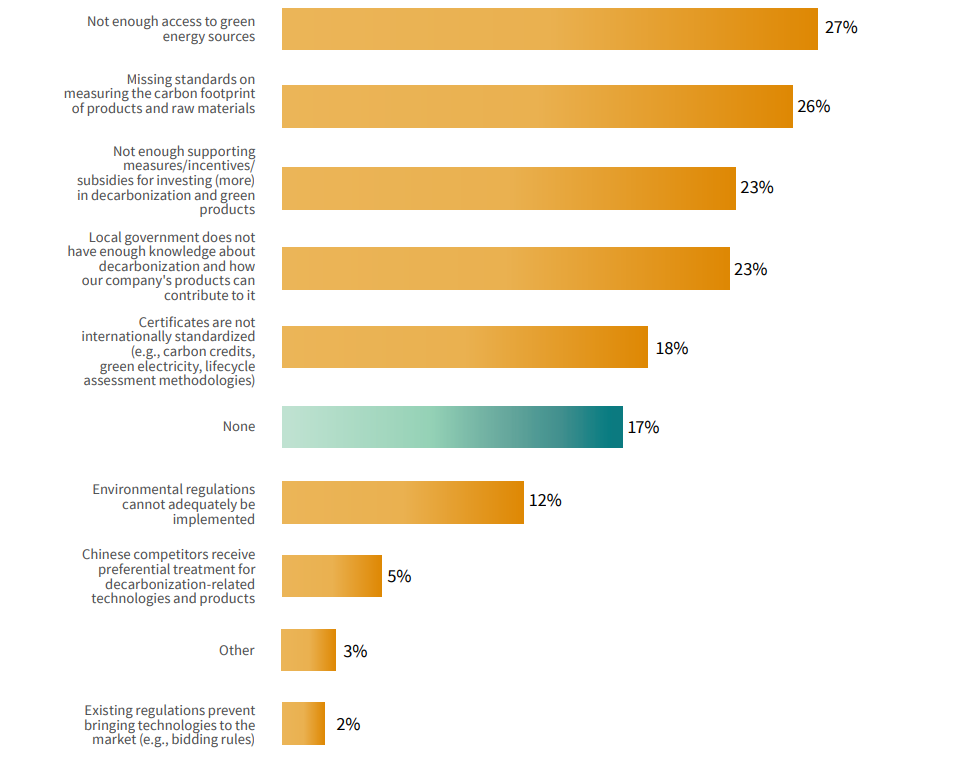GERMAN COMPANIES’
COMMITMENT TO GREEN
ENERGY
HOW GERMAN COMPANIES
ACCESS
GERMAN COMPANIES’ COMMITMENT TO GREEN ENERGY
Promoting the use of green energy is one of the key
measures taken by the Chinese government in its efforts
towards decarbonization, meaning reducing carbon
emissions from the peak level by 2030 and achieving
carbon neutrality by 2060. The country is targeting to reach
up to 50% of renewable energy consumption by 2030 as
well as issuing policies requiring particularly multinational
cooperations and energy-intensive industry players to
speed up the development of green energy.
Decarbonization – and with it the use of green energy – has also been on the agenda of German companies for a long time. German companies, especially multinational enterprises in chemicals, new materials, and in the automotive and bio-pharma industries, have become the main players in using green energy. The major drivers are to be part of the headquarters’ sustainability strategy At present, German companies mainly access green energy through Green Energy Trading, self-built Green Energy Generators, or the purchase of Green Energy Certificates. Green Energy Trading refers to direct energy trading with generators of wind power and photovoltaic power as well as the procurement from grids. Self-built Green Energy Generators mostly mean the installation of solar panels or wind turbines for direct power supply for their own usage. Green Energy Certificates are electronic certificates issued by the National Renewable Energy Information and fulfill their social and ecological responsibilities of promoting low-carbon transformation, to meet customer requests, and to achieve sustainable development throughout their own supply chain. While German companies are strongly committed to using green energy, they still face considerable challenges in implementing their targets.
The following contents are based on discussions and roundtables with German companies during the last months. By drawing attention to major obstacles that German companies face when accessing green energy, we aim to advocate towards the Chinese government on a central and local level for better support in this matter. Doing so will further unleash the potential for German companies to contribute efficiently to China’s decarbonization goals.
HOW GERMAN COMPANIES ACCESS AND CLAIM GREEN ENERGY
At present, German companies mainly access green energy through Green Energy Trading, self-built Green Energy Generators, or the purchase of Green Energy Certificates.
Green Energy Trading refers to direct energy trading with generators of wind power and photovoltaic power as well as the procurement from grids. Self-built Green Energy Generators mostly mean the installation of solar panels or wind turbines for direct power supply for their own usage. Green Energy Certificates are electronic certificates issued by the National Renewable Energy Information and fulfill their social and ecological responsibilities of promoting low-carbon transformation, to meet customer requests, and to achieve sustainable development throughout their own supply chain. While German companies are strongly committed to using green energy, they still face considerable challenges in implementing their targets. The following contents are based on discussions and roundtables with German companies during the last months. By drawing attention to major obstacles that German companies face when accessing green energy, we aim to advocate towards the Chinese government on a central and local level for better support in this matter. Doing so will further unleash the potential for German companies to contribute efficiently to China’s decarbonization goals. & Management Center. They are backed by actual green energy generation from large-scale onshore wind or solar PV plants. With these certificates, companies can claim the usage of green energy for further reducing the carbon footprint and to achieve the company’s sustainability goals.
Most companies use a combination of these methods in order to include as much green energy as possible into the mix and reduce their carbon footprints accordingly.
MAJOR CHALLENGES REMAIN
While German companies are already very committed to using green energy and thereby contributing to China’s renewable energy consumption targets, considerable challenges remain.Our recent Business Confidence Survey 2022/2023 shows that accessing green energy is the biggest challenge German companies face when implementing the “30-60” decarbonization goals
GERMAN BUSINESS IN CHINA | BCS 2022/2023 German companies still face challenges to reach the 30-60 decarbonization goals
Which challenges does your company face when implementing the “30-60” Decarbonization Goals (which hinder your company
from reaching its full potential)? (n=477)

The following are some of the major obstacles for German companies:
INSUFFICIENT AND UNBALANCED SUPPLY OF GREEN ENERGY RESOURCES
The supply of renewable energy is limited and cannot meet the demand of all industrial customers. At present, green energy resources such as wind and solar are concentrated in the northwestern regions of China, while the majority of industrial production capacity demanding more green energy is centralized in the eastern coastal areas. This creates an imbalance of supply and demand regarding green energy accessibility.
Additionally, the green energy products that can be traded in China are only from large central generators. Green energy from distributed power plants – mainly smaller and local photovoltaic projects – cannot currently be traded as green energy products.
What we advocate for:
It is necessary to enlarge the availability of green energy in the market. Green energy projects (distributed generation) have been widely implemented by many companies in China and should be an extra trading option in the market. With this, companies could more easily purchase green energy from a nearby smaller generator.
UNDERDEVELOPED INTER-PROVINCIAL TRADING OF GREEN ENERGY
Local governments usually prioritize their own stable
power supply. This leads to local green energy resources
being primarily channeled to local corporate consumers.
There are some initial inter-provincial trading pilots (e.g.,
in the south). However, due to the differences of trading regulations in different provinces, overall inter-provincial
trade of green energy has not yet fully developed. As a
result, the green energy needs by various companies in a
certain location collected by local power bureaus are often
not transferred to other provinces in a systematic way.
What we advocate for:
German companies need a functional inter-provincial trading system. The threshold for inter-provincial transactions of green energy must be minimized and there should be the possibility to carry out these transactions on a regular basis. The rules for implementing regular inter-provincial green energy trading should be formulated on a national level, making it transparent and easier for German companies to plan their green energy usage.
LACK OF INTERNATIONAL HARMONIZATION OF GREEN ENERGY CERTIFICATES
For German companies, the green energy certificate system as a market-based renewable energy mechanism plays an important role. The current green certificate system in China, however, is not fully recognized by international markets and vice versa. In addition, pricing for green certificates in China is high compared to international standards (up to 10 times higher). On the other hand, when international certificates are used in China right now, the headquarters in Germany are often concerned whether these are really accepted in China.
What we advocate for:
The harmonization of green energy certificates between the EU and China is required so that companies have more
certainty which certificates to use. Foreign and Chinese companies alike would greatly benefit from a harmonized
internationally recognized system. One single officially recognized green energy certificate mechanism should be
implemented. To avoid double-accounting or double-claiming, the green value of green energy should be traceable
and reliable. Ensuring its international recognition would greatly add to the credibility of domestic certificates.
At the same time, it is necessary to bring the domestic certificates closer to global pricing and develop certificates with parity price for non-subsidy projects. This would strongly enhance the competitiveness of domestic green certificates in terms of pricing.
Furthermore, the scope of renewable energies accounted for by green energy certificates needs to be enlarged to also include renewable energy sources from distributed generations and not only from large-scale projects.
LACK OF LONG-TERM TRADING OPTIONS
Currently, green energy trading in some regions is primarily carried out on a monthly or yearly basis in the Chinese market. There are only limited long-term options for selected companies to conduct green energy trade with generators, such as via power purchase agreements (PPA) for 10-20 years. PPAs currently are mostly based on "cooperation framework agreements", through which only the basic intent to cooperate and expectation of transaction volumes are agreed upon. The annual transaction volume and transaction price are not defined but left for further negotiation. This increases the risks of rising costs in future and does not give the trading parties the incentives to pursue large-scale green energy transactions.
What we advocate for:
PPA trading models need to include long-term trading options and pricing details. A market-based mechanism needs to be established to fix the price of green energy for long-term PPA projects. This will help create long-term plannability for German companies.
LINKAGE BETWEEN CARBON MARKET AND GREEN ENERGY IS MISSING
Using green energy has a direct impact on the carbon footprint of companies. Currently, the carbon market does not fully recognize the carbon reduction effect achieved by the use of green energy. This is disincentivizing companies from increasing their green energy consumption when targeting the reduction of their carbon footprint.
What we advocate for:
The barriers between the green energy market and carbon markets should be cleared up. Thereby, the environmental value of green energy consumption will become more beneficial to corporate users.
We encourage the Chinese government to actively promote the important role of green energy consumption in dealing with China's carbon market and EU carbon tariffs. This could effectively increase the enthusiasm of enterprises to purchase green energy.
TIMELY AND TRANSPARENT POLICY
COMMUNICATION AND IMPLEMENTATION
German companies in China are eager to contribute to China’s decarbonization path and their demand for green energy is increasing. However, the Chamber’s recent survey shows that one of challenges in accessing green energy in China is lacking transparency of related policies. Also, local officials are often unsure about the next steps or are lacking the knowledge to solve the problem.
What we advocate for:
On the national level, the actual nationwide implementation needs to be more strongly coordinated and the status of the different provinces in implementation needs to be made more transparent. On a local level, companies need to have clarity on, for example, what the plans and the approach for green energy distribution in a certain location are and who the right contact person at the local power bureau is. We would also welcome more frequent and regular training and briefings on green-energy transactions and related policies and the demonstration of practical cases for German companies.
The German Chamber of Commerce welcomes China’s efforts towards decarbonization and to further establish stable access to green energy resources. German companies welcome, for instance, the recently jointly issued notice by the National Development and Reform Commission (NDRC), the National Bureau of Statistics (NBS), and the National Energy Administration (NEA) that the renewable energy consumption (REC) will be excluded from aggregate energy consumption for corporations. This is a step in the right direction and we would welcome more regulations like this.
The Chamber is ready to support the Chinese government in this effort and thereby create an environment where German companies can fully unleash their potential in contributing to China's decarbonization and green energy goals.
Article Resource: German Chamber of Commerce in China
English Version:https://workdrive.zohopublic.com.cn/external/0fdaa9aa44c18a9bacf5d5e81d6322e4ea70c68cc1033944d484bec1cb6f3542
Chinese Version: https://workdrive.zohopublic.com.cn/external/a0bca95c53de073289df54de404999d8f5a8707df14d9e9d4dfc094ec2850143

